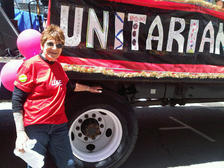 Safe at any speed/A UU photographer Once I rode in the Pride Parade in a motorized cable car for seniors. It was my first time to participate. Last year, I was a wheel monitor for the Unitarian Universalist truck of musicians from the Oakland UU. I was in charge of the right rear wheel, mostly to be sure no one fell under it. I can’t say trudging along in the exhaust of the truck was as much fun or made me as proud as when I rode with other older women, waving at people who cheered and laughed when they read our sign, “Two, four, six, eight, what makes you think your grandma’s straight.”
And despite missing the parade this year, officiating at a wedding in the redwoods in Lagunitas, I feel proud that I and the gay and straight parade participants and cheerers who line Market year after year support the inclusion of all people whatever their sexual proclivities and activities.
When I first considered pride, I did so because the then-minister was preaching about each sin. Because I am familiar with all seven, I was part of the service and had my four minutes as Worship Associate. Doing my research at the time, I found that Wickipedia called pride the deadliest of the seven sins, the one from which the other six flow. Furthermore, hardly anyone has escaped the admonishment that pride goeth before a fall. As I learn more about eastern traditions, I worry less about any of the seven including this deadliest one, pride, and pay more attention to grasping or pushing away.
But since yesterday was Pride Parade in San Francisco, I am inclined to think about pride and what makes me most proud of myself. I’d have to say it is my humility.
In the days of having a significant other, I recall a conversation like this. I am introduced to my girlfriend’s friends, one of whom says to me, “I hear you are a writer.” Rather than a thoughtful response, a pause or an inquiry, I stiffen, unhappy with a ready-made label, even if it is positive and something I could be proud of. Really priding myself on abhorring labels, I say solemnly, “A writer is someone who writes. Do you see me writing?” Following the silence, the conversation veers away, sparing me embarrassing questions like “Have you been published?” What do you think of Joyce Carol Oates?”
I grew up in a family that said achievement and honors signal superiority. Over the years, family bragging solidified in me anti-aggrandizing strategies to ward off feelings of inferiority and self-loathing, as none of my accomplishments seemed big or important enough. Sundays at the Cousins’ Club I remember how my Uncle Ben would regale the rest of us with his son, my cousin’s, accomplishments. He’s been appointed chair of an English Department. He’s had a book published, and it’s the story of my father’s life. What have I done lately?
Of course, accounts of other family members’ superior achievements can inspire children to seek and earn acclaim, preferably punctuated by trophies, prizes or certificates of merit. But these accounts can also have the opposite effect. In my case, from childhood up, tales of superior family accomplishments created an urge in me to try to accomplish nothing worth bragging about. Perhaps a kind of false modesty more than the real thing.
It’s been my experience that fragile egos like mine do one of two things, neither of which looks or sounds like pride or humility. We may hunker down behind a barrier built for protection, a false case of don’t show and don’t tell. Behind such a barrier resentment builds each time nobody notices or listens.
On the other hand, fragile egos can catalog their accomplishments for a very long time, taking every conversational break as an opportunity to detail their splendor. To these people, I am willing to listen for five minutes and no longer. Apparently the biblical admonishment not to hide one’s light under a bushel has passed the candle stage and become a neon sign with pulsing arrows that end in a big “me.”
I don’t know which is worse or less interesting, listening to others belittle their accomplishments, or bragging on and on. In either case, I don’t have the energy or interest, no matter how kind I wish to be. But I don’t consider the wonderful sense of accomplishment we feel when we have done the right thing to be a deadly sin at all. I’m sure the ancients had more heinous crimes in mind when composing their list of sins and calling the worst one pride.
In fact, once pride became an operating principle in my life rather than just a five-letter word, I realized that there is actually plenty of praise, prizes, and pride to go around. If I want to, I can write a book about my father’s life and publish it myself. And next year as I ride or walk in the parade in spirit or in fact, I will celebrate my own as well as everybody else’s accomplishments no matter how big or small.
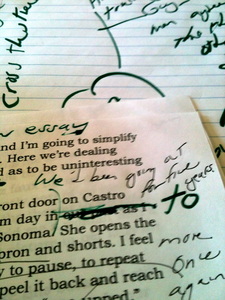 Green ink/Alison R. “The real voyage of discovery consists not in seeing new landscapes but in having new eyes.” That from Marcel Proust for whom the memory of “squat, plump little cakes called ‘ petites madeleines,’’’ occasioned his spiraling into childhood ecstasies in Remembrance of Things Past. Although I had traveled to Cuba to view the unfamiliar, I had continued to see as I often do, with “old eyes,” apprehensive, not quite trusting any discoveries about Cuba or myself. Yet once back in the safety of my San Francisco surroundings, I decided to risk giving new eyes another try although I would not have to go far, only a few blocks, for this different way of looking. I feel apprehensive as well as excited to sit at the dining room table of a much admired and published writer on a Sunday afternoon, three of my blog posts cum essays spread in front of us. This writer said that when I came back from Cuba, I could buy an hour of consultation with her, during which she will help me look at my writing and perhaps discover a next step as a writer. With several books on bookstore shelves, including a memoir and a book on how to write, she can, I hope, give feedback that could point me in a fresh direction. Perhaps she will see such potential or raw talent that she may even ask me to enroll in her upcoming memoir workshop. Maybe even suggest a scholarship. In addition to wishful thinking, I have told myself that this is a chance to be vulnerable, to look at my own outpourings from a professional perspective and accept criticism without flinching. After we shake hands and sit down, she clips her take-apart glasses together over her nose and reaches into a jar of ballpoints, pencils and colored markers from which she chooses green to scrawl across my printed pages, crossing out words and lines as well as circling paragraphs as she searches for what she thinks should be the pith of each piece. As she reads, she asks questions, mostly “Why?’ It seems that my work here is to respond to the why. Why those particular words? Why lime green instead of chartreuse? Why had I never told my girl friend in the five years we were sweeties that the way she dressed sometimes made me squirm? Why had I substituted my niece’s real name with Turquoise and not Jade or Ruby? Flipping through the three blog posts I have printed out for her, she dismisses “ Dog is Love,” noting that no one wants to read about the death of someone else’s old dog even if that dog is a pit bull with cancer and the reason your son can love you. Too sentimental, limited appeal. But she does recommend a paragraph near the end as a likely beginning should I consider a rewrite. She wants me to look at each piece of my writing with fresh eyes and discover what one thing I really have to say. I’m glad I like to revise, even more than I enjoy struggling through a first or second draft. But when I see her cross out the entire first paragraph of “ Should Happens” with a green slash, I gasp. I see that without the first paragraph, the second paragraph just hangs there. There’s revision and there’s major surgery. “Don’t write about writing,” she directs, as the green marker continues its relentless progress, unless it’s a book about writing. It will not be interesting, slash, to anyone but the writer. In the margin of page two she scribbles dialogue I might include once I undertake this particular revision. As the green marker zips across each page, she chuckles at a phrase or a footnote. In those moments, I relax about the colorful cross outs and circles that decorate each manuscript. I want to ask her to stop the green drizzle to show me what she likes and tell me why she likes it. When finally I find my voice to ask her outright if she thinks I can write, she may have answered that of course I can write. And why would she spend time with me if I had no potential? I have forgotten what she actually did say. I remember that when I was a writing teacher, and my students yearned to be reassured, I probably said something like anyone can write, so of course you can write, but do you and will you? As the hour ends, she says her best advice to me is to start over. She tells me to find a writing group, dismissing my hint that I might benefit from her workshop for memoir writers because clearly I have no memoir in progress, only short pieces in need of major restructuring. So how do I feel about risking my fragile ego? The old way to see this experience would be to be discouraged A better way to deal with disappointment is with a heated “I’ll show you.” Okay, so I am not a septuagenarian genius and there’s not a book yet, but I’m pretty sure I have a title for that book when finally it is written. It will be from a poem by ee cummings –“may i be i.” “may i be i is the only prayer—not may I be great or good or beautiful or wise or strong.” Or someone else. May it be so and soon.
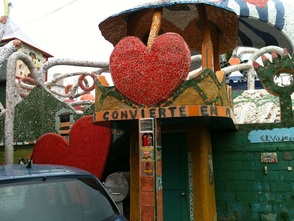 Fuster transforms the community/AlisonR Pictures I took show some of what I saw. There was so much to see and many ways to be impressed by this country of contradictions.
Gaudy Gaudi – That’s my nickname for the mosaics decorating 80 houses in the barrio of Jaimanitas on the outskirts of Havana. Created by renowned Cuban artist José Fuster using tiles and bits of discarded stones and glass, the run down community is transformed into color and dreaminess.
Peeling paint – Over the years, salt air has stripped away paint and now different layers of color give each building its own look. Paint is hard to come by because of the U.S. blockade (bloqueo in Spanish)
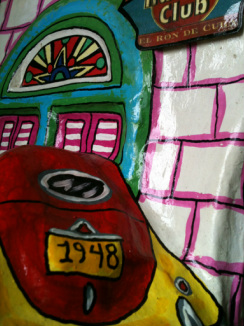 Car replica creation/Alison R Colored License plates – Indulge me in the following explanation culled from an on-line publication by the Filipino Global Community written in February of 2010. "Authorities keep tabs on people and their vehicles through color-coded license plates, a system copied from the former Soviet Union. “The government owns most cars. They have blue plates with letters and numbers that indicate when and where the vehicle can operate and whether the driver can use it for personal as well as professional reasons. Executives at government-run firms - who get caramel-colored plates — have more leeway. "In Cuba, the first letter in the license plate indicates which of 14 provinces the car hails from, such as "H" for Havana. The letter "K" means the car is privately owned -- either by a person or by a foreign firm. Military vehicles have mint-green, rear-only plates; olive-green plates are for vehicles issued by the Ministry of the Interior, including Fidel Castro's fleet of armored Mercedes 280s, which were built between 1982 and 1984. Black plates are for foreign diplomats, who don't have to adhere to traffic laws. White-plated vehicles are driven by Cuban government ministers or heads of state. The last three digits on diplomatic plates often denote the professional rank of the driver. So, if you're stuck behind a gray Mercedes with black license plate 179-004, that means the fourth most-important officer from the Russian embassy is likely behind the wheel. Rental cars get maroon plates. Foreign journalists, religious leaders and Cubans working for overseas firms have neon-orange ones. Red "provisional" plates allow vehicles to circulate while authorities sort out just what color tag they should get. Most of the half-century-old American roadsters that create a moving museum along the island's potholed streets have yellow license plates, meaning they are vehicles owned by ordinary Cubans. "Detroit's chrome-and-tail-fin era cars are still prominent on the roads because Cubans with non-VIP jobs can buy and sell only cars manufactured before the Castros took power in 1959. Buying newer vehicles requires government permission, including justifying how you can afford a car when the communist state controls well over 90 percent of the economy and pays employees an average of about $20 a month.” philSTAR.com
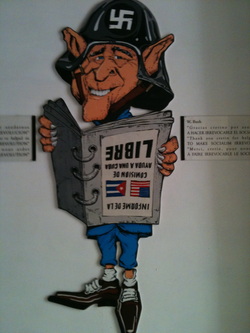 Cartoon in Palace of the Revolution/Alison R The American Bloqueo – Also referred to as an embargo, it is the reason Cuba doesn’t have McDonalds or Walmarts as well as paint.
Propaganda – With few products to sell, billboard space and walls sell the revolution. My favorite anti-imperialist blast seen in Havana on the way to the airport translates, “Blockade: the longest lasting genocide in history.” Of course, Ernesto Che Guevara’s face is for sale on every visible surface from tea cups to bibs, and one sees the less familiar face of Camilo Cienfuegos, a revolutionary who fought along with Fidel. Officially, America is a villain; personally, I felt cared for.
Tour Buses – Big, made in China or Russia and owned by the state. Perfumed, air conditioned and faithful to their schedules. Drivers politely assist passengers at each stop.
Alcohol – Pina Colada –Blend Havana rum, cream of coconut and pineapple juice with crushed ice until smooth. Garnish with a pineapple slice and a maraschino cherry. As for a Mojito, take a generous sprinkling of sugar and add the juice of half a lime and some scrunched up mint leaves, mix it up, pour on a stiff measure of light dry rum and add soda water and ice... and serve with a straw. Both drinks available almost anywhere, even bus stops on the way to and from hotels.
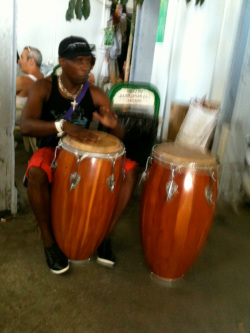 Musician in Havana market/AlisonR Music – Everywhere, all the time. And every duo, trio, quartet or drummer peddled a CD. I couldn’t fault the ways Cubans found to make money, whether making music in state-owned restaurants, markets or by wheeling a dog in sun-glasses, sucking a pacifier into a plaza on a bicycle for tourist photos.
Food – not very good. Because we were 74, plus guides and drivers, not many restaurants could accommodate a group our size. Restaurants are mostly state-owned and while the service is kind, the food is not especially good even if you like rice and beans, called Christians and Moors because of the colors of the rice and the beans. For smaller groups dining out, private restaurants called paladares offer food in people’s homes. I ate pizza one night at 9:30 p.m. in a small outdoor restaurant three blocks from the Copacabana Hotel where we stayed the first three nights of our visit. The cook said no fresh tomatoes that night. It was okay though.
Cuba is beautiful, complicated, paradoxical, socialist, and tourist-friendly. Go there when you can, but go with a small group of people you know well enough to process what you see, hear and experience.
 Japan Airlines Boeing 777-300 / Peter Russell This Cuba cold is a pain and a drain. If I imagined I would be in form to explore the experience we 74 travelers shared, I was wrong. What follows then is a reflection I made in the Unitarian Universalist worship service last January. It is about being wrong.
Some wrongs are simple. Sent a mass mailing with an incorrect date? Done that. Formed an opinion about someone based on nothing but a hairstyle? Done it. Bought a $600 brown knit wrap at a craft show, got home and hated it enough never to wear it? Done that. Filed an income tax return from a sick bed, high on decongestants? Yup.
But what about more complicated decisions? When I flew Japan Airlines back home to California in the early ‘70s, I was leaving a privileged but constricted life as the wife of an American businessman with a Japanese client. I was the mother of three boys. The youngest, born in Japan, was nine months and I took him with me. The other two, ten and eight, I left in Japan with their father. I imagined they would follow, and we would be a mother and three children in a one-bedroom rental with the boys sharing a bedroom and the baby in the living room with me.
But in Japan, the boys were enrolled in a private school, with the benefits of a company-provided car, driver, maid and three-bedroom house in Tokyo. Thus, when they came to visit me in the place I could afford, a low-income section of Los Angeles, they clamored to go back and live with their father. I told them, “No, you are going to live with me, but I will let you visit your father before school starts.” They went and they did not come back. I waited for them to start school in September. Their father sent their clothes, but he did not send them. Several years went by before they visited me and their little brother again. And when they came, they made it clear that they would not stay, as their father had been moved to Thailand where their lives continued: interesting and privileged.
When I left my older sons and my marriage, my privileged life in Tokyo with unlimited access to the American Club, what filled me with a conviction of rightness about what I was doing? What did I believe that brought me back to California, to no job, no car, single-parent responsibility for a baby and just $350 in my pocket? I didn’t know if my decision was right or wrong.
Kathyrn Schulz in her book Being Wrong, wrote “Beliefs are models of the world that help us take action; and accordingly, incur consequences.” The beliefs that led me to leave Japan were many: I didn’t belong overseas coasting on top of the culture as the wife of an American businessman. Without a useful role, my life lacked purpose and a sense of belonging. I believed the war in Viet Nam was wrong but because of my husband’s business venture, I could only demonstrate carefully in the streets of Tokyo and dodge riot police. I felt my sanity and my identity were at risk. My belief that the older boys needed me, and I should be their father’s wife carried far less weight.
And so I pretended that this jaunt to Los Angeles was temporary. I said to the boys as we waved goodbye, “See you in a few weeks,” though I would not come back, and of that I was certain.
Schulz says about certainty that “one of the most defining and dangerous characteristics of certainty … is that when we are caught up in our own convictions, other people’s stories –which is to say other people—cease to matter to us.” It’s true, I didn’t think, “My sons have no mother now.” “My husband, what will he be thinking?” In the certainty of my decision, I mattered most.
Was I wrong? Was I right? Should I have stayed? Should I have gone? A lot of time has passed and, at least in this case, I have come to see right and wrong as sides of a mobius strip, twisting wrong and twisting right with risk and outcome always in play.
|







 RSS Feed
RSS Feed